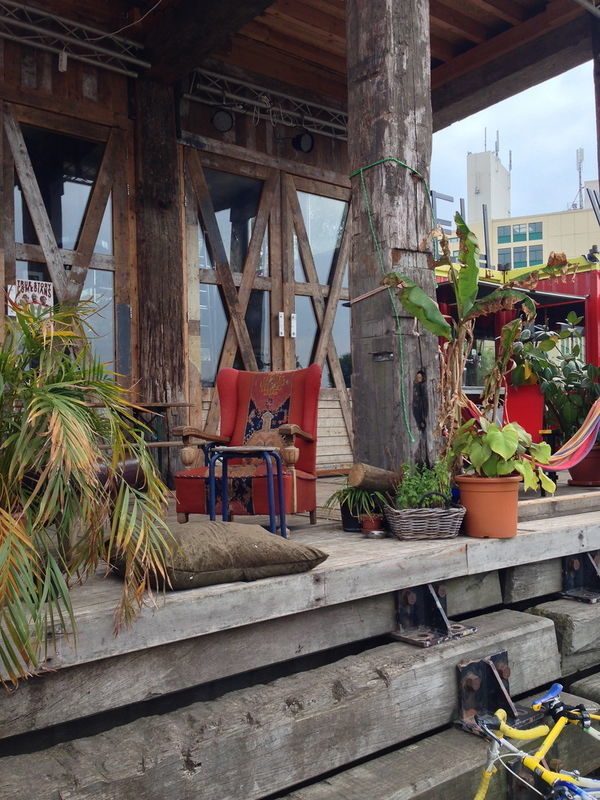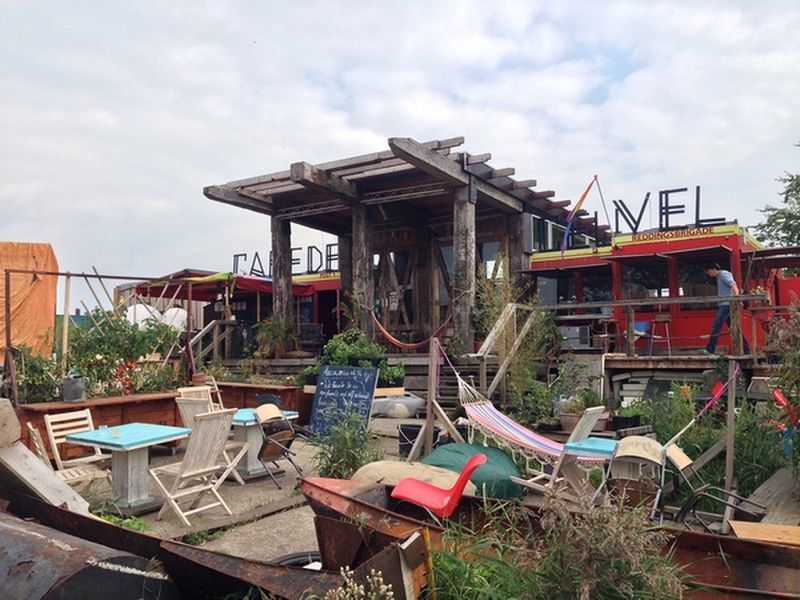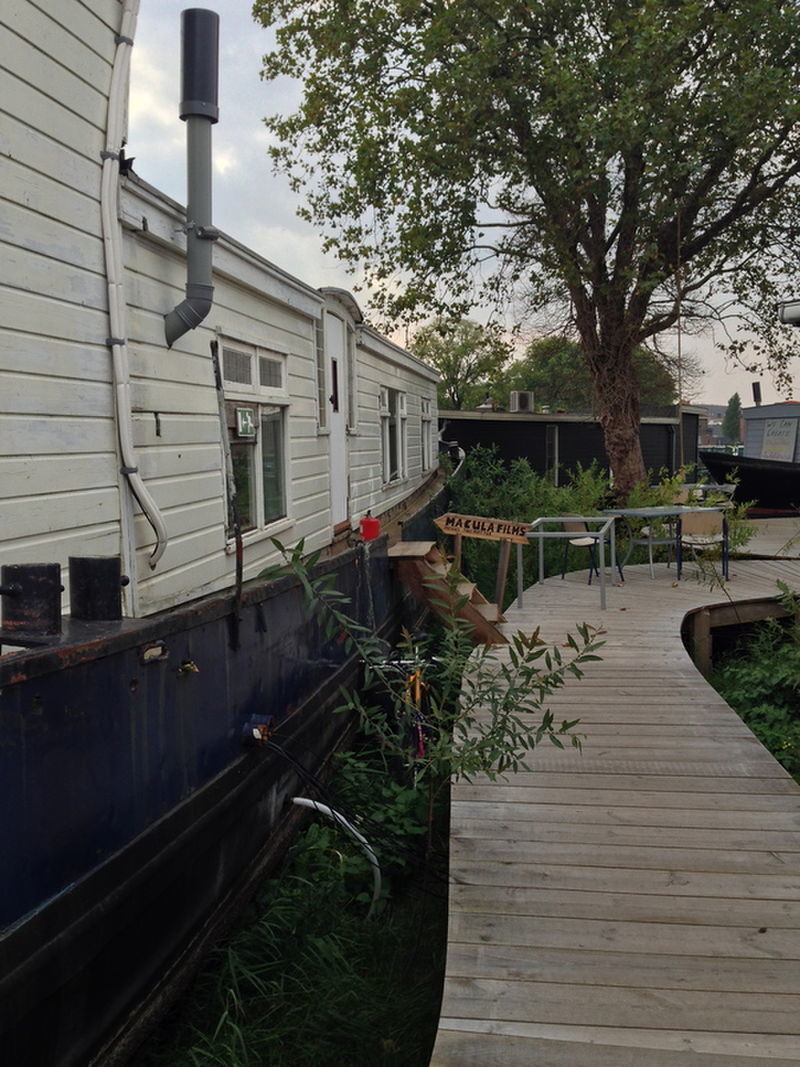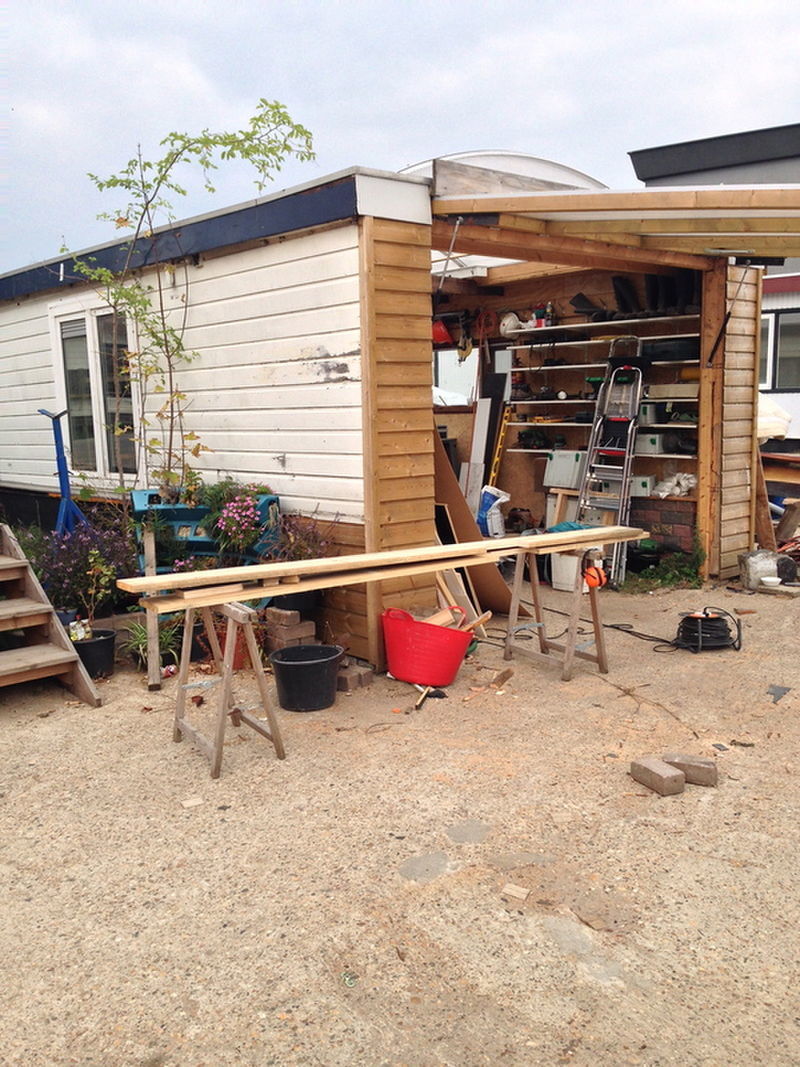Difference between revisions of "De Ceuvel"
(→Breeding as trial) |
(→Up-cycling) |
||
| Line 34: | Line 34: | ||
[[File:ceuvelworkshop.jpg|800px]] | [[File:ceuvelworkshop.jpg|800px]] | ||
| + | A workshop at De Ceuvel | ||
=== Creative incubator as try-out === | === Creative incubator as try-out === | ||
Revision as of 14:51, 27 January 2015
Author: Carli Schenkeveld
Next to the van Hasselt canal at the IJ in Amsterdam-Noord, a former ship warf today harbours a very special association of creative and social entrepreneurs. This polluted, fallow piece of land had found a new temporary function in which the polluted soil will be cleaned, left-over houseboats are reused and autarkic ways of living, working and building are tested and shown in a Do It Yourself manner. De Ceuvel is run by a group of landscape-/architects, artist, photographers, designers a.o. Due to their amazing plan that combines sustainabilitya and social motives, stimulates the local economy (keeping transport cost low) and sets up a foundation as well as an incentive, the site was appointed for a 10-year lease from the Municipality of Amsterdam. Running for almost one year now, De Ceuvel already established an up and running public cafe called Café de Ceuvel. Also the site harbours workplaces for creative and social entrepreneurs, which at the same time serves as a community of entrepreneurship. This is not just any kind of community, you will not find a place like this anywhere else in Europe as extensive as De Ceuvel.
a self-sustaining Café
The cafe is the first thing that catches your eye on the site because of it's robuste architecture. The frame seems to be built from old harbor bollards. The entire cafe turn out to be constructed completely(!) with up-cycled materials. Referring back to the roots of the area, an old ship warf in the harbor of Amsterdam. The Café is already very popular to the people of Amsterdam for their good food. Real, healthy, pure and delicious food and as much home-made as possible. The vegatables are bought from the nearby '50/50-green garden'. The soda's are being home-made and the mushrooms from Amsterdam urban farming. In the future it will also be possible to buy locally produced vegetables & fair-trade coffee beans.
In addition to serve food Cafe de Ceuvel also likes to share their knowledge and skills about good food. Through food events anyone can join, like lectures, workshops and tastings. Besides that the cafe also wants to provide a stage for art expostitions, bands, theatremakers and filmmakers, as a true creative melting pot.
The building will be as self-sufficient as possible. For example it contains a digester which digests kitchen waste into gas, to be used again in the kitchen. The urine is being refined & re-used.

pavilion designed by architect Wouter Valkenier
Purifying the soil
Due to the polluting activities of the shipping industry, the site is highly polluted by heavy metals and motoroil. Digging the dirty soil out is an intensive job and a very expensive one as well. Therefore the creators joined forces with DELVA Landscape Architects in collaboration with the University of Ghent. They came up with an organic idea; purifying the soil by using phytoremediation techniques. 'Phyto' is Latin for plant and 'remediation' means restore balance, the balance of the soil is being restored through planting plants that are able to take in, degrade and break off the pollutants. It will probably take approximately over 30 years until the soil will be cleaned entirely. The plants will eventually be fermented in a biogas digester, which will be used to cook and stoke.
Space&matter and Metabolic Lab provided the design and technical outfitting of the boat retrofits, together with construction foreman and boat expert Huib Koel.
Up-cycling
Because of the polluted soil it is not possible to bury water and gas pipes, a sewer and to build a foundation in the ground. Therefore the creators are re-using depreciated houseboats from the canals of Amsterdam. Throwing out an old houseboat costs a lot of money for the owner. Plus the boats are usually not even entirely damaged, but are leaking and just are no longer suitable lying in the water. Taking over the ownership is a win win situation on a sustainable level; waste is being prevented, the owner is happy he's rid of it and the houseboats are free of charge which keeps overall costs low. Besides, after the 10-year lease has come to an end, it's a fast and almost waste-free way to remove them again. Once ashore these houseboats are placed on frames above the ground. A wooden boardwalk connects the working places in an elegant way. It's like walking through a wetland. Right now De Ceuvel contains of over 15 houseboats, which all accommodate the offices, ateliers and workshops social and creative entrepreneurs. Just like Café de Ceuvel, the houseboats are re-using water, by filtering it through sand. For energy the roofs are coverd with solar panels. The public areas like Ceuvel Café and Bed & Breakfast are a part of the future plan to become entirely self-sustainable. Re-using water & energy.
The artists and designers, landscape architects and entrepreneurs of Cafe de Ceuvel together form the community De Ceuvel. All together they contribute their own part to keep this society running. It functions as a trial for the participation-society. Where everybody does its bit and a lot of volunteers and a 'shoulders to the wheel'-mentality shows that it is possible.
Creative incubator as try-out
The formal industry terrain was slowly formed to this unique urban development. Over all De Ceuvel is an innovative and grand initiative. To recognize that power comes from sharing the knowledge that is obtained through this beautiful social, self-sustainable project. In time of economic crisis it learns that creative thinking and a well organized and solid plan have a fair chance to make a change. For a better world of tomorrow.


